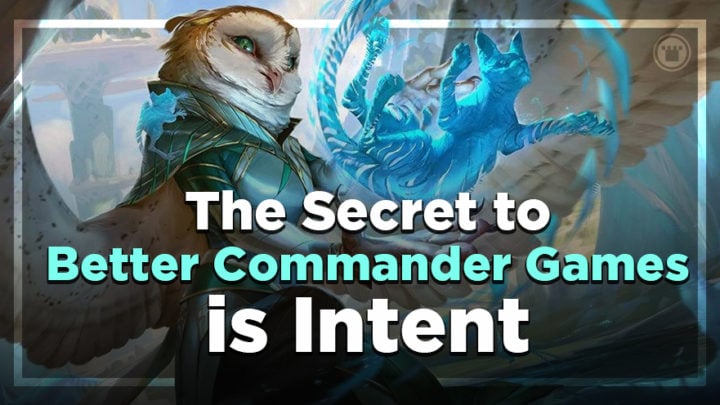When you sit down to a game and shuffle up, what do you hope for? Personally, I hope that “this game is the best one yet.” The most foundational approach for this is to have clear and open Rule 0 conversations. These have had a healthy time in the spotlight lately, with more and more creators including these conversations in videos or having them live on stream. However, there is another, lesser-mentioned element that rarely gets talked about, and can make or break a game or even a playgroup: Intent.
Most players just want to have good, fun games. Sometimes, this attitude is enough to carry them through, but there are times when they’ll wonder why a play didn’t come across well, or why the table banter doesn’t seem to be as lively anymore. Good games start with Rule 0, but it’s not as simple as “set and forget.” Good intentions are crucial to maintaining table relationships and are shown through your actions in every aspect of the game. From deck building to politics, you can find ways to convey that you’re hoping to make each game as enjoyable as possible. This applies to every commander, deck, and strategy; you’d be surprised what you can get away with once your intent is clearly understood!
Combos Are The Friends Of The Casual Game
Combos tend to get a bad rap, particularly in more casual groups. We’ve all experienced it: after agreeing on a lower power level, someone stumbles into an infinite combo just a few turns into the game. “It’s never performed this well before,” they’ll say, but it never feels great. This has happened so often that it’s one of the primary associations with combos in Commander, but that needn’t be the case.
I am a huge advocate for adding combos to most decks, particularly ones that otherwise would be slow to close out a game. Their purpose is twofold: to go over the top of most battlefields and close out the game in good time, and to give your decks a greater range of playability.
Most games tend to reach what feels like an organic endpoint. Each player has had a chance to do their own thing, and the excitement is starting to turn into a slow grind. While some players love this state, it can become trying for even the most patient players. Instead of getting bogged down in the minutiae of a crowded battlefield, you can simply demonstrate your combo before shuffling up and starting anew. Your opponents will usually be thankful that they get to play another game instead of trudging through the trenches for another hour.
The existence of an infinite combo in a deck also helps it hold its own at stronger tables, without threatening to make lower powered games miserable. The key to this is intent: If you’re playing a casual game, having a great time, and you draw your combo pieces, do you play them? For me the answer is almost always “no”; sure, I’ll win if I play it, but I’ll be depriving myself and the table of a great game. The decision to have a good time with your pod over trying to win at all costs is a conscious choice, but it makes all the difference.
A Lesson In Tutors
Tutors aren’t very good cards in and of themselves. They don’t usually provide card advantage, and they’re entirely dependent on the power of the cards they’re fetching. At the same time, it’s that second point that makes them so good in higher powered decks, providing redundancy in your win conditions and blowout cards. As such, they’ve acquired a similar reputation to combos, and they often go hand-in-hand with more powerful tables.
Again, this isn’t how it has to be. Tutors can help you to provide a more engaging experience when used correctly, even at more casual tables.
I run a number of tutors in my casual decks, but I use them with specific intent; I don’t just use them to fetch up my combo pieces. Instead, I might use Invert//Invent in my Niv-Mizzet, Parun deck to grab a Mystic Retrieval and a Narset’s Reversal, or transmute a Dizzy Spell for Curiosity, then put it on my Electrostatic Field for the fun of it. If I need to deal with a problem in a tense situation instead, these tutors still ensure I’m well-equipped to find an answer. However, when the game has reached its natural endpoint, I can find the piece I need to combo off quickly. You can even be restrictive with your tutor targets if you wish; my favorite package is a Trinket Mage with a few low-impact targets, just to give me some extra flexibility. These are the most effective uses of tutors in casual Magic, and they can really improve your overall experience in Commander.
Know When To Fold ‘Em
Sometimes, it’s okay to lose. Generally speaking, you’re only likely to win around 25% of your games, so losing with dignity is an invaluable skill.
Let me paint the scene: You’ve been playing a casual game for more than an hour, you’ve had some good fun, but you’re still some ways away from winning. Your opponent tries to go for the kill, but you have a timely removal spell in hand. Do you use it?
My answer is often “no” here. If we’ve all had our fun but have no clear path to victory, I generally won’t stop the game from ending. I’ll reconsider a board wipe if it’ll only serve to prolong the game. Again, it’s not the most spiky line, but I reserve those for higher power games and Modern. In a no-stakes game of Commander, I value the time I have at the table too much to miss out on playing a fresh game instead.
Essentially, don’t let the “strategically correct” play stop you from making the “right” play for the game.
Everything In Moderation, Even Mass Land Destruction
With the right intentions, you can get away with a lot of what are considered “social taboos” in Commander. Mass land destruction is often frowned upon at most casual tables, but once again, its ties with ill intent cast it into disrepute. There is a time and a place for everything, including obliterating everybody’s resource system.
Kristen mentioned recently that she runs Catastrophe in her Aurelia deck. It’s a board wipe when at parity or falling behind, or the ideal way to prevent interaction for a turn or two while she wins with her board state. Provided the second mode is used responsibly and in context of the overall play experience, it’s a perfectly respectable option. As she said, “just don’t be a jerk” with it.
Kingmaking Can Be A Good Thing, Actually
This can be a touchy subject. Some players are sensitive to the concept of kingmaking, which can make a nuanced conversation about this difficult. So before I continue, I’ll add a disclaimer: Talk about this with your group first. Not all groups will be okay with this, and their thoughts are ultimately what matter most.
Generally speaking, this is not a particularly noble decision, but it has its rare uses. For example, I have a very friendly rivalry with Tom, one of the players in my playgroup. We’re good friends — we regularly test Modern together, we talk at length about food, and if we’re ever the last two players in a game of Commander, it tends to turn into a bit of friendly competition. I know that our relationship is solid enough that if I brought up the idea of kingmaking other players to “spite” each other for hilarious or dramatic effect, it’d likely be welcomed. We understand one another’s intentions, and we both know we mean only to add to the lighthearted atmosphere. I also make a point to mention our rivalry to newcomers, so they’re in on the joke, too; if they don’t like it, we wouldn’t try anything if anyone wasn’t approving.
It’s a fine line to walk, but the rewards can feel like a real life anime betrayal. As with everything, there is a chance that it doesn’t work out or the joke doesn’t land. In that case…
Apology Is The Most Potent Remedy
Even with the best of intentions, not everything is going to land the way you want it to. You might misread someone’s attitude or assess threat levels incorrectly, and it can leave a sour feeling. These fumbles often negatively impact the flow of the game, and more importantly, they could upset a friend. Apologizing sincerely is a skill, and it’s one that we could all stand to practice more.
Explaining your true intentions can also go a long way to getting back on track toward your goal, provided your apology takes center stage. We’re all susceptible to being human, and acknowledging this is the first step in tempering the bridges that would have otherwise burned.
***
Communication is difficult, and no one’s expected to be perfect at it. There have been times where I played with like-minded players and had difficulty enjoying myself. But since I’ve started viewing Commander as a team activity and making my intentions clear, my wish of having the best game possible has come true again and again. The strategies I’ve shared today won’t eliminate all possible issues, but they’ll allow you and your playgroup to enjoy more games.

Scott is an Irish content creator and the Head of Budget Magic for the Izzet League. He focuses on affordable decks in Pioneer, Modern, and Pauper, particularly ones that stray from the mainstream. When he’s not writing about his favorite decks, he can be found talking incessantly about them on Twitter and on The Budget Magic Cast.

